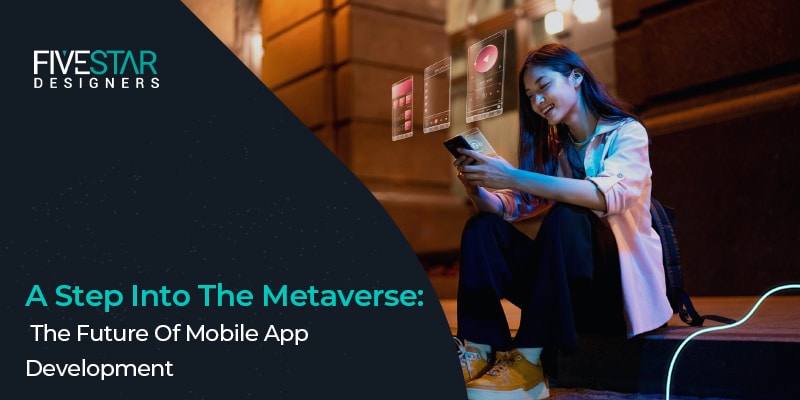The metaverse isn’t just a figment word that is thrown around randomly anymore, it’s a whole new ecosystem waiting to be built. And you already know that the driving force behind it is mobile apps.
With increasing advancements and popularity in the VR/AR technology sector, the demand for seamless experiences across virtual and augmented realities has risen exponentially. Let’s take a look into how the metaverse converges with iOS app development as well as Android app development, to reshape the future.
Why Mobile Devices Are Central To The Metaverse
If we take a moment to think about it, mobile devices are ubiquitous, as their capabilities become more and more advanced each year. Processing power, AR integrations, and immersive displays play a key role in the strive to create apps that work flawlessly within the metaverse.
Unlike traditional applications, these apps demand:
- Real-time 3D rendering.
- Cloud-based synchronization.
- Cross-platform compatibility.
For an app development agency, these demands mean crafting solutions that push hardware and software boundaries.
Major Components That Define Metaverse Apps
Here’s where things get technical. Designing an app specific to the metaverse means you’re in an entirely different ballpark as compared to conventional mobile app development.
Here are the 3 must-haves that can help you level up on traditional app development and allow you to take a step further into the metaverse:
1. Spatial Computing
The sole purpose of the Metaverse is to look beyond the veil of 0s and 1s. Spatial computing is the backbone of metaverse app development. Apps need to integrate AR and VR technologies that allow users to interact with 3D environments naturally.
2. Interoperability
Your app’s universe doesn’t end at its borders. Users expect such an environment that allows you to seamlessly move around their digital assets across multiple platforms providing a unified experience. Utilizing APIs and blockchain for interoperability is non-negotiable.
3. AI-Driven Customization
How can any kind of tech today cope without AI integration? AI customization does the heavy lifting in personalizing user experiences, predicting behaviors, and optimizing 3D environments. It’s a game-changer for both Android and iOS app development strategies.
Challenges in Metaverse Mobile App Development
Building for the metaverse isn’t all sunshine and rainbows. Here’s where app developers need to roll up their sleeves:
1. Device Compatibility
Not all smartphones are created equal. Balancing high-end features with accessibility is an ongoing battle for any app development agency. This leads to a smaller audience and hurts the app’s inclusivity.
2. Latency Issues
The metaverse is about real-time interactions. Latency ruins the immersion as lagging behind in interactions leads to detrimental results. Edge computing and 5G integration are pivotal solutions here.
3. Data Security
The more immersive the app, the more data it collects. And the more data it collects the harder it is to safeguard. Ensuring airtight security protocols without hampering performance is a key challenge in metaverse app development.
How App Developers Are Shaping the Metaverse
The role of app developers isn’t just about coding. They’re architects of experiences. Their responsibilities include:
1. Prototyping Immersive Interfaces
Rapid prototyping tools allow developers to iterate on virtual environments efficiently. Wireframes and mockups of the app give a predictable idea of how it behaves in the metaverse.
2. Utilizing SDKs
Development kits for AR and VR play a huge role in expediting the process of mobile app development for metaverse applications. These kits allow accelerated development of apps by offering ready-made solutions that are already tested in the metaverse.
3. Optimizing UX for AR/VR
You can’t really slap on one of the traditional UIs for an AR/VR-based app. Crafting intuitive interfaces for AR glasses or VR headsets is a fine art. Nobody wants to navigate through a faulty, unresponsive UI when immersed in the metaverse.
The Road Ahead for Metaverse App Development
With massive investments pouring into the metaverse, the demand for cutting-edge mobile apps is set to explode. The future will likely see:
1. More immersive apps:
With AR and VR tech evolving, expect apps to bridge physical and virtual realities even more seamlessly. With VR games already taking the gaming community by storm, we can expect some truly mind-boggling immersive apps in the future.
2. Advanced AI integration:
There is no doubt artificial intelligence is dominating the mobile app development industry and we are certain that AI will be able to elevate customization and make apps smarter and faster than ever before.
3. Enhanced cross-platform development:
Tools that streamline iOS and Android app development processes will rise in prominence as every app no matter what platform will feature a unified experience.
Closing Thoughts
We’re standing at the intersection of imagination and technology. For app developers and agencies diving into metaverse app development, the challenge isn’t just about coding—it’s about pushing the envelope of what’s possible.
With the right blend of innovation and technical prowess, the metaverse will become less of a concept and more of a lived reality. Are you ready to create apps that will shape this brave new world?



